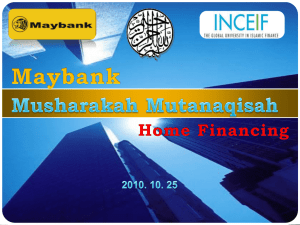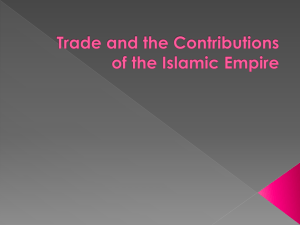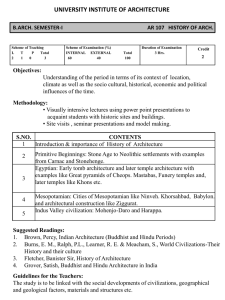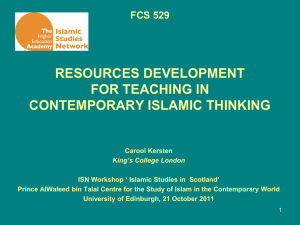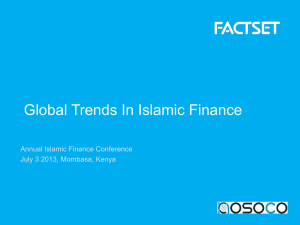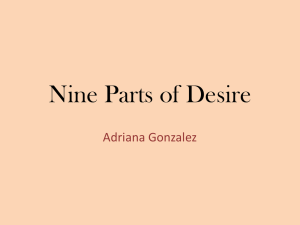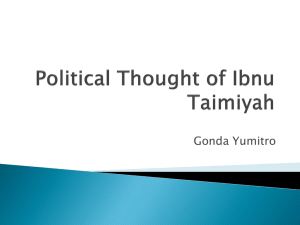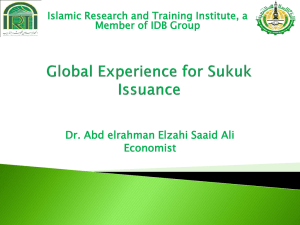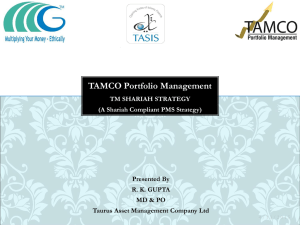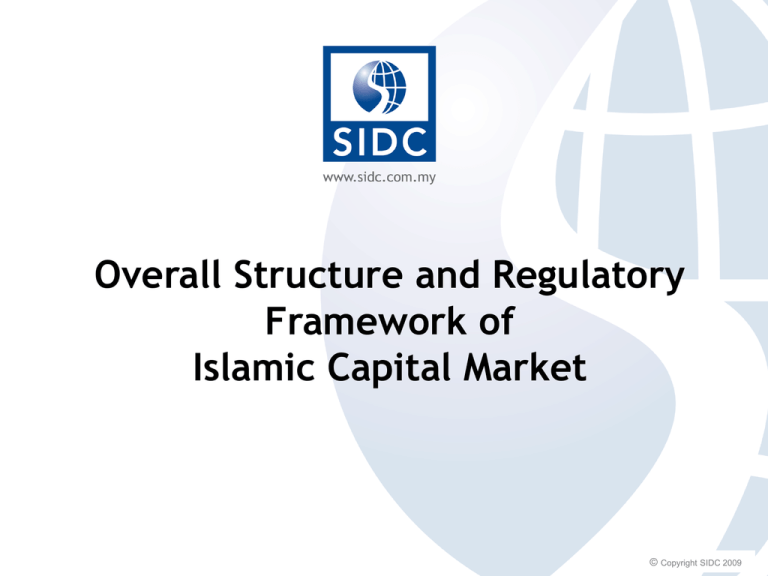
Overall Structure and Regulatory
Framework of
Islamic Capital Market
© Copyright SIDC 2009
Islamic Financial Market In Malaysia
Islamic Financial Market
Islamic Banking &
Takaful
Islamic Capital
Market
Equity
Islamic banking Financial
Products
•
•
•
•
Shariah deposit investment products
Money market products
Financing products
Other Investment products
Takaful Investment
Products
• Takaful products
• Takaful linked investment products
Islamic Interbank
Money Market
•
•
•
•
•
Shariah compliant securities
Islamic indexes
Islamic Unit Trust
Islamic ETF
Islamic venture capital / PE
•
•
•
•
Islamic Fund Management
Islamic REITs
Islamic Structured Products
Islamic stockbroking
Sukuk
• Asset-based sukuk
• Asset-backed sukuk
• Investment Sukuk
Shariah-compliant derivatives
Exchange traded
• Crude Palm Oil Futures
• Crude Palm Kernel Oil Futures
• Single Stock Futures
(provided the underlying shares
are Shariah-compliant)
OTC
• Islamic profit rate swap
• Foreign Exchange swap
• Cross Currency Swap
2
Regulatory framework for Islamic capital
market products and services – equity
• Capital Markets And Services Act 2007 (CMSA) [Investor protection and disclosure requirement
http://www.sc.com.my/eng/html/cmsa/cmsa.html
• Shariah compliant securities
Guidance issued with List of Shariah-compliant Securities booklet
• Islamic Unit Trust
Guidelines on Unit Trust Funds (Provision)
http://www.sc.com.my/eng/html/resources/guidelines/cis/08_cis_utGLa.pdf
• Islamic REITS
Guidelines on Islamic Real Estate Investment Trusts
http://www.sc.com.my/eng/html/resources/guidelines/UTs/Islamic%20REIT%20GL.pdf
• Islamic Fund Management
Guidelines on Islamic Fund Management
http://www.sc.com.my/eng/html/resources/guidelines/FundManagers/IslamicFundManagement.pdf
• Islamic Structured Products
Guidelines on the Offering of Structured Products (Provision)
http://www.sc.com.my/eng/html/resources/guidelines/bondmkt/SP%20GLs_Revised_270407.pdf
3
© Copyright SIDC 2009
Regulatory framework for Islamic capital
market products and services – equity
• Islamic ETF
Guidelines on Exchange-Traded Funds (Provision)
http://www.sc.com.my/eng/html/resources/guidelines/ETF/ETF%20Guidelines.pdf
• Islamic venture capital / PE
Guidelines and Best Practices on Islamic Venture Capital
http://www.sc.com.my/eng/html/resources/guidelines/VC/0805_islamicVC.pdf
• Islamic stockbroking
Best Practices In Islamic Stockbroking Services Undertaken by Participating Organisations
http://www.bursamalaysia.com/website/bm/rules_and_regulations/bursa_rules/downloads/bm_cir_rr1
6_180907.pdf
4
© Copyright SIDC 2009
Regulatory Framework for Islamic Capital
Market Products and Services – sukuk
• Islamic Asset-Based Sukuk
Guidelines on the Offering of Islamic Securities
http://www.sc.com.my/eng/html/resources/guidelines/Guidelines-Islamic%20Securities260704.pdf
• Islamic Asset-Backed Sukuk
Guidelines on the Offering of Asset-Backed Securities (Provision)
http://www.sc.com.my/eng/html/resources/guidelines/guidelines_assetbacked260704.pdf
5
© Copyright SIDC 2009
The SAC Provides the Impetus for Islamic
Capital Market Development
•
Issues list of Shariah-compliant securities
based on clear guidelines and criteria
–
•
The list serves as a catalyst for the
development of Shariah compliant
products and services
Publish book on “Resolution of the
Securities Commission Shariah Advisory
Council”
–
Provide clarity on the resolutions and views
of the SAC
6
© Copyright SIDC 2009
Structured Investment
Products
http://www.bankinginfo.com.my/01_plan_your_finances/0105_structured_investments/structu
red_investments.php?intPrefLangID=1
7
© Copyright SIDC 2009
They are fixed term investments
Structured investment is a form of
investment that can potentially bring
about higher returns, compared to other
investment products, like fixed deposits.
Although it promises higher returns, it
also comes with higher risks.
Structured investments are often linked
to the performance of various
underlying assets such as interest
rates, foreign exchange, equities, fixed
income instruments or market indices.
A structured investment has a maturity
period depending on the features of the
products. If redeemed before maturity,
your investments may lose part of the
returns and/or principal.
They can either be principal protected
or non-principal protected.
The level of risks involved in non-principal
protected structured investments are
higher compared to principal protected
structured investments. There is no
guarantee on the amount of money you
will receive on non-principal protected
structured investments even if you hold
them to maturity.
8
© Copyright SIDC 2009
The returns on structured investments vary, are usually not
guaranteed and are dependent on the performance of the
underlying assets during the investment period. You may face
losses if the performance of the underlying assets differs from
what you have anticipated. The returns on certain structured
investments may also be affected in movements in foreign
exchange.
Non-principal protected structured investments usually give
higher returns compared to principal protected investments. This
is mainly because of the higher risks involved in the investment.
Structured investments can be used for income growth purposes.
However, as in any investment, there are potential risks involved.
As a savvy investor, if you are considering to invest in high-risk
investments such as structured investments, you should have an
asset portfolio that includes low risks assets such as fixed
deposits.
9
© Copyright SIDC 2009
As the name suggests, dual currency investment (DCIs)
is a form of structured investment dealing with foreign
exchange risks where your investments will be made in
one currency (called 'base currency').
At maturity, you will either be paid in the base currency
or in another currency (called 'alternative currency'). As
an investor, you can choose both the base currency
and alternative currency.
However, remember that if the banking institution pays
you in the alternative currency, you could experience a
loss on your principal when you convert it back to the
base currency if the foreign exchange rates did not
move in the direction you anticipated.
10
© Copyright SIDC 2009
HOW STRUCTURED INVESTMENT PRODUCTS
WORK
Structured investment is a form of investment that
can potentially bring about higher returns, compared
to other investment products, like fixed deposits.
Although it promises higher returns, it also comes
with higher risks.
Structured investments are often linked to the
performance of various underlying assets such as
interest rates, foreign exchange, equities, fixed
income instruments or market indices.
Interest rate-linked structured
investment
For an interest rate-linked structured investment, the
returns are usually linked to some interest rates. There is
usually a formula that refers to a specific floating interest
rate (e.g. the Kuala Lumpur Interbank Offer Rate
(KLIBOR).The actual returns depend on the interest rate
movements. For example, if KLIBOR moves WITHIN the
agreed band during the investment period, you will receive
a positive return on your investment. On the other hand, if
KLIBOR moves OUTSIDE the agreed band during the
investment period, there will be no investment return for
you. You will only receive the amount of your initial
investment.
11
© Copyright SIDC 2009
Difference between Fixed Deposits and Structured
Investments
Fixed Deposit
Minimum amount
required
RM500
Return: Fixed interest
rate
Yes
Potential enhanced return/interest (performance
pay-off)
Structured Investments
Floating rate negotiable instruments of deposits:
RM100,000
Investments linked to derivatives:RM250,000
(Only applicable for investments with a minimum interest
feature)
No
Yes
Full principal sum
payable on
i. Maturity
Yes
(Applicable for principal protected investments only)
ii. Early withdrawal
Yes
Investors may lose part of their return and/or principal.
The amount to be paid to investors depends on the
market value of the underlying assets.
iii. Early redemption by
bank
Not Applicable
Yes
Relatively
risk-free
Return can be affected by various types of risk such as
interest rate risk, market risk foreign currency risk, and
early termination risk.
Yes
No
Risks involved
Protection by Malaysia Deposit Insurance
Corporation
12
© Copyright SIDC 2009
Deposit Taking Tools
• Structured Deposit Investment Products are popular alternative to
straight deposit-taking mobilisation products based on wadiah or
Mudharabah. Why?
– Limit imposed on deposit insurance cover (?)
• Wadiah deposits though under the Shariah structure is a guaranteed contract,
banking laws limit the bank’s liability only up to the Deposit Insurance (Takaful)
limit i.e. RM60,000 in Malaysia.
• Customers have no recourse to this claim in Shari’ah courts as such deposits are
bound by Laws of Contracts, under the jurisdiction of the Civil Courts
– Better yield to customers
– Capital protected
– Better financial planning tools
• Popularity of Structured Investment Products now increasing
– Made possible through creative use of Shariah approved transaction
contracts and modern portfolio management
• “Deposit” mobilisation now popular via investment products
13
© Copyright SIDC 2009
Structured Deposit Products
1. The term “structured product” means any investment product that
falls within the definition of “securities” …… which provides the
holder with an economic, legal or other interest in another asset
(“underlying asset”) and derives its value by reference to the price
or value of the underlying asset;
2. The term “underlying asset” means any security, index, currency,
commodity or other assets or combination of such assets.
* Securities Commission Malaysia, Guidelines on Structured Products
The definition of Structured Deposit Investment products can also be
applied as per the above definition
14
© Copyright SIDC 2009
Product Structure
•
The foundation of the structured deposit investment products is:
– Asset allocation based on the principles of modern portfolio theory.
• Efficient asset allocation takes advantage of the fact that truly different
asset class returns are uncorrelated.
• They react differently to changing market conditions.
– In other words, stocks, bonds, real estate, and other assets often do
well or poorly at different times
• This feature can be used to obtain a combination of expected return and
risk control that meets an investor’s profile.
• In effect, portfolio diversification offers the classic advantages
whereby:
–
a well-diversified portfolio may offer a better combination of return and risk
than any individual asset class or security.
• Of course, no method of investing may guarantee a profit or protect
against loss.
–
HOW is then mitigated?
• Capital Protection instead of Capital Guarantee since the basis of the
deposit is either Musharakah or Mudharabah
• Capital portion is invested in Sovereign Securities or AAA-rated Securities
15
© Copyright SIDC 2009
Product Types
• The vast majority of Islamic deposit investment structured products
launched to date are:
– Capital-protected
– Equity-linked structures
– Commodity-linked structures
– Generally referenced to equities selected from the Islamic
Indices (DJIF, FTSE Islamic Index, etc.)
• Since these products incorporate to an extent some derivatives
element, they derive its value by reference to the price or value of
the underlying asset
• The products represent unique opportunities that allow for better
risk management and provide the investors with valuable portfolio
diversification tools
16
© Copyright SIDC 2009
Examples of Contract Applications
These structures typically use concepts already accepted in Islamic finance as
building blocks such as Mudharabah, Murabahah, and Salam
For instance, in some sample of products:
– CIMB uses Restricted Mudharabah
– BNP Paribas uses a Murabahah deposit to provide the protection
• Use of reverse Murabahah or Tawarruq
–
BNP also uses Salam to structure a number of capital-protected products that
offer investors participation in the upside of a basket of stocks from the Dow
Jones Islamic Index.
• These products have many of the same characteristics of conventional structured
investments, such as profit lockins, look-back and call features.
– While an Urbun contract is used for the equity or fund-linked payout
17
© Copyright SIDC 2009
Definitions
Wakalah:
An agent, which can be appointed for any act allowed by the Shariah
Murabahah:
Effectively the forward sale of a physically owned commodity. In the case of
structured products, the investor pays the value of the commodity, which is
sold by the bank at a deferred date. At maturity, the investor receives the
assets, which are worth the same as the amount initially invested.
Urbun:
Entitles the investor to purchase an asset at an agreed price at any time up
to the maturity of the contract – effectively an option.
Salam:
A sale with deferred delivery of exchanged goods but with advanced price
payment – to create the capital-protection element.
18
© Copyright SIDC 2009
Investment Linked Takaful
Products
19
© Copyright SIDC 2009
Definition
• Investment-linked Takaful Product (ILTP) are products
that:
– Offer a safe and efficient investment structure to
provide minimal internal costs
– Investment-principal protection, and
– Takaful cover in the event of death of the investor or
disability benefits
– The investment fund is divided into units of equal
value to derive at the investment-linked unit price.
• This unit price is published daily in the newspapers
for holders to track the value of your investments.
20
© Copyright SIDC 2009
Takaful Concept
•
In an investment-linked takaful:
– Part of your contribution will be allocated to a takaful fund in the form of
participative contribution (Tabarru’), and
– the balance of the contributions will be used to purchase the investmentlinked units.
•
Holders undertake a contract (Aqad) to become one of the participants by:
– agreeing to mutually help each other, should any of the participants suffer a
misfortune arising from death or disability.
• If the holder do not make any claim during the period of takaful, he will
be entitled to a share of the surplus in the takaful fund.
• The surplus will be shared between you and the takaful operator based on
the concept of surplus sharing according to a pre-agreed ratio.
• The Holder’s share of the surplus will be used to purchase additional
investment-linked units.
•
The takaful operator acts as a manager to oversee the management of the
investment fund. In return, the takaful operator receives a fee (ujrah) for its
service.
•
The contract of participation by the Holder is either Wakalah or Mudharabah
21
© Copyright SIDC 2009
Difference with Investment Linked
Insurance Products
• Insurance companies also offer investment-linked product
for Shariah-approved Securities Funds, whereby:
– The investments are invested in Shariah-approved
investment instruments
– Whilst the insurance cover does not conform to the
Shariah requirement.
22
© Copyright SIDC 2009
Capital
Guarantee and Protection
23
© Copyright SIDC 2009
Capital Guarantee & Capital Protection
Capital Guarantee is derived from a separate third party
Guarantees in the form of a financial instrument (such as
bank guarantee), corporate guarantees or other collaterals to
ensure that the investor will not suffer any loss at all on the
amount of the invested capital even if the underlying
investment did not perform well.
Capital Protection is the feature of a specific structured
product wherein is embedded a derivative securities, that
have the capability to ensure that the investor will get back
at maturity a part or the totality of the money he has
invested in the purchase of the product on day one.
24
© Copyright SIDC 2009
Why Capital Guarantee is disallowed in
Contracts of Musharakah or Mudharabah
Contracts of participations such as Musharakah or Mudharabah
demands risk participations by way of:
Profit & loss sharing (Musharakah), or
Profit sharing (Mudharabah)
In both cases guarantees are only allowed on the capital for
recovering losses from misconducts by the managing musharik or the
mudharib
Guarantee on performances are disallowed
As an investment strategy, structured products invest in low-risk
securities such as Shariah compliant Government Securities or ‘zerocoupon’ Sukuk
25
© Copyright SIDC 2009
Shariah Rulings
AAOIFI ( Shari’ah Standard No.13)
The capital provider is permitted to obtain guarantees from the mudharib that are adequate
and enforceable. This is circumscribed with a condition that the capital provider will not
enforce these guarantees except in cases of misconduct, negligence or breach of contract on
the part of mudharib. [6/0]
Dallah Al Baraka
It is not permissible for an investor to demand from the entrepreneur (mudharib) to pay him
a fixed percentage of the value of the contract, besides the capital sum, irrespective of the
amount of investment involved or whether the project is profitable or in loss. Such a
contract is unlawful because it involves a guarantee from the entrepreneur respecting the
capital sum, whereas a mudharib is a trustee and cannot be held responsible for the capital
sum except in cases of transgression or negligence. [ al-Baraka first symposium, Fatwa No.2]
Majelis Ulama Indonesia
In principle, the capital should not be guarantees unless the loss of capital is caused by the
negligence of the entrepreneur. [Fatwa No : 07/DSN-MUI/IV/2000]
26
© Copyright SIDC 2009
Capital Guarantee on Various Sukuk
Structures
Capital Guarantee on sukuk can be seen in light of the purchase undertaking
of sukuk by the issuer.
This kind of purchase undertaking is considered as capital guarantee to the
investors.
Therefore, the purchase undertaking at face value is not permitted in the
investments sukuk such as sukuk Musharakah and sukuk Mudharabah as this
impermissibility is in line with Hadith Rasullullah:
أن الخراج بالضمان
“We have to face the risks in order to get the profit from investments”
Sukuk Al-Ijarah:
AAOIFI resolution in 2008, purchase undertaking at face value is permitted
under sukuk Ijarah.
27
© Copyright SIDC 2009
Example of Capital Protection
The most common capital protected fund under Shariah
compliant structured products structure is whereby:
the fund invest a portion of their assets in fixed income Shariah
compliant securities likened in feature to a ‘zero-coupon ‘Sukuk
or Shariah Compliant (SC) Government Securities designed to
pay out the total amount invested at a fixed maturity date. This
date is naturally dependent on the prevailing profit rate
environment and the amount of capital the fund can set aside
for this purpose without hampering performance.
For example a USD 100 portfolio could purchase for example
USD 60 worth of ‘zero-coupon’ Sukuk in the expectation that in
10 years the value of those sukuk would be USD 100. The
remaining USD 40 would then be invested in other investments
that have more attractive returns or in profit locked-in products
such as in Tawarruq contracts.
28
© Copyright SIDC 2009
Capital Protection Structured Products:
Strategy 1
Tawarruq Contracts
with locked-in profits
Initial
Investment
USD100
USD 40
USD 60
‘Zero Coupon Sukuk’ or
SC Government Securities
Profit Locked in
feature to ensure
more returns to
investor
100% Capital
Protection
INVESTMENT LIFE OF THE PRODUCT
29
© Copyright SIDC 2009
Capital Protection Structured Products:
Strategy 2
Profit Locked in
feature to ensure
additional returns
to investor
Once the Capital Protected component has matured,
the portion is reinvested in other profit locked-in
feature investments e.g. Tawarruq.
USD 60
Initial
Investment
USD100
Tawarruq Contracts
with locked-in profits
USD 40
USD 60
‘Zero Coupon Sukuk’ or
SC Government Securities
Profit Locked in
feature to ensure
more returns to
investor
100% Capital
Protection
INVESTMENT LIFE OF THE PRODUCT
In this alternative, the capital protection matures before the life of the product. To enhance
earnings the USD60 is reinvested in other profit locked in investments. Derived profits will
ensure additional income to investors
30
© Copyright SIDC 2009
Shariah-Compliant Investment
Instruments
31
© Copyright SIDC 2009
Shariah-based Unit Trust Fund
l
Key Features
Collective investment fund
Invests in Shariah-compliant securities
May be single or multiple asset classes
l
Benefits and applications
Diversification – portfolio of securities
Convenience – single transaction
Liquidity – transact with management company
Low minimum capital outlay
32
© Copyright SIDC 2009
Investment Instruments (2)
Islamic Exchange Traded Fund (ETF)
l
Key Features
Passively managed unit trust fund, listed & traded on stock exchange
Objective is to provide returns that closely correspond to performance of
benchmark index - can be single-asset or blended index
l
Benefits and applications
Diversification – portfolio of securities
Convenience – single transaction
Liquidity – traded on stock exchange
Transparency – component stocks disclosed and their performance can be tracked
on real-time basis
Cost Efficiency – no sales charges, and lower management fees than most equity
unit trusts
Low minimum capital outlay
33
© Copyright SIDC 2009
Investment Instruments (3)
34
© Copyright SIDC 2009
Islamic Real Estate Investment Trust (REIT)
l
Key Features
Collective investment scheme, may be listed or unlisted
Invests in real estate and/or real-estate-related assets / securities
Objective is to generate returns from rental income and capital
appreciation
l
Benefits and applications
Investment in real estate without direct ownership
Liquid and more affordable instrument for participation in real estate
Diversified portfolio of real estate assets
Typically stable income stream translates to potentially regular
dividends
35
© Copyright SIDC 2009
36
© Copyright SIDC 2009
Shariah Screening
37
© Copyright SIDC 2009
Islamic Equity
Islamic equity investment starts with Shariah compliant
securities
Shariah-compliant securities
Securities (ordinary shares / equities) of a company listed on Bursa Malaysia
which is classified as Shariah permissible for investment
Primary business and investment activities that generate income for the
company are consistent with Shariah principles
In Malaysia, the body that gives Shariah endorsement is the Shariah Advisory
Council (SAC) of the Securities Commission (SC)
38
© Copyright SIDC 2009
Based on Shariah compliance review
criteria
Classified as
approved if
company’s
involvement in
the following
activities is
minimal :
1.
Financial services based on riba (interest)
2.
Gambling
3.
Manufacturing or sale of non-halal products
4.
Conventional insurance
5.
Entertainment
6.
Manufacture or sale of tobacco-based products or
related products
7.
Stockbroking or share trading in non-approved
securities
8.
Other activities deemed non-permissible
1.
Interest income from conventional fixed deposits / interest
bearing instruments
2.
Dividend income from investment in non-approved
securities
39
© Copyright SIDC 2009
Specific benchmark are established
To asses the level of mixed contributions from the activities that are clearly prohibited
such as riba (interest based companies like conventional banks), gambling, liquor
and pork
5%
To assess the level of
mixed contributions from
the activities that involve
the element of ‘umum
balwa’ which is prohibited
element affecting most
people and difficult to
avoid e.g interest income
from fixed deposits in
conventional banks and
tobaccao related activities
25%
10%
To asses the level of mixed
contributions from the
activities that are generally
permissible according to
Shariah and have an element
of maslahah to the public,
but there are other element
that may affect the Shariah
status of these activities e.g
hotel and resort operations,
share trading, stock brocking
20%
To assess the level of contributions from mixed
rental payment from Shariah non-compliant
activities, such as rental payments from
premises used in gambling, sale of liquor, etc.
40
© Copyright SIDC 2009
Islamic Equity Market
- Shariah compliant securities
•
85% of Bursa stocks are Shariah-compliant
•
Shariah-compliant market cap of RM627.8 bil (US$196 bil) or 64.6% of total market cap
•
FTSE-Bursa Malaysia Shariah indices based on internationally compliant criteria
FBM EMAS Shariah
FBM HIJRAH Shariah
Year
M-cap of
Islamic
Equities (RM
bln)
% to total market
capitalisation
2000
247.49
54.74
2001
285.50
59.23
2002
290.42
57.55
2003
391.12
57.70
2004
457.32
59.93
2005
439.77
63.25
2006
548.42
64.62
2007
705.05
63.74
May2008
627.84
64.60
Shariah Compliant Securities Listed
on Bursa Malaysia
85%
15%
Shariah Compliant
Non Shariah Compliant
41
© Copyright SIDC 2009 41
Capital Market
42
© Copyright SIDC 2009
What is Capital Market?
Capital Market
Any market in which securities are traded. Capital markets include the stock and bond markets.
Companies and governments use capital markets to raise funds for their operations; for
example, a company may issue an IPO while a government may issue a bond in order to conduct
new or expand ongoing activities. Investors purchase securities in the capital markets in order to
extract a return and earn profit on the securities. Capital markets include primary markets, such
as IPOs that are placed with investors through underwriters, and secondary markets, where all
subsequent trading takes place, such as the New York Stock Exchange. Government agencies in
different countries regulate local capital markets, though some, especially exchanges, play some
role in regulating themselves.
Source: Farlex Financial Dictionary. © 2009 Farlex, Inc. All Rights Reserved
43
© Copyright SIDC 2009
What is the Islamic Capital Market?
Islamic Capital Market
Any market in which Shari’ah compliant securities are traded. The Islamic Capital markets
include the Shari’ah compliant stock and Islamic bonds or Sukuk markets. Companies and
governments use the Islamic Capital markets to raise funds for their operations; for example, a
company may issue an IPO while a government may issue an Shari’ah compliant securities or
bonds in order to conduct new or expand ongoing activities. Investors purchase Shari'ah
compliant securities in the capital markets in order to extract a return and earn profit on the
securities. The Islamic Capital markets include primary markets, such as IPOs that are placed
with investors through underwriters, and secondary markets, where all subsequent trading
takes place, such as the New York Stock Exchange or Bursa Malaysia. Government agencies in
different countries regulate local capital markets, though some, especially exchanges, play some
role in regulating themselves.
Source: Adapted from Farlex Financial Dictionary. © 2009 Farlex, Inc. All Rights Reserved
44
© Copyright SIDC 2009
Thank You
Wan Abdul Rahim Kamil
Islamic Capital Market Consultant,
Securities Commission Malaysia
rahim@seccom.com.my; wark06@gmail.com
45
© Copyright SIDC 2009

